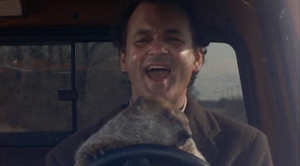
Some sci-fi films are aggressively marketed as such with stirring trailers and boastful news stories about how good they are, how much they cost, or some conflation of the two. Others sneak into the movie dead zone of early February, marketed as comedies from the team that brought you Ghostbusters and Caddyshack. Groundhog Day‘s not generally regarded as a sci-fi movie, but it introduced more people to the idea of stable temporal loops than anything outside of Star Trek. Sci-fi fans should totally claim it while the claiming’s good. Comedy fans (assuming such people still exist) don’t seem to be using it.
Anyway, it’s a classic that hasn’t aged a day in the years since its release…apart from a minor point about long distance telephone lines sure to confuse anyone would can’t do research or remember the early 1990s. Technical stuff aside, Groundhog Day‘s still a frighteningly accurate portrait modern ennui and its dozens, if not hundreds (or three hundred millions) of permutations. It’s not as “funny” as some entries on the resumes of its director or its headliner, but it is more human. We would also accept “humane” as a descriptor, since the movie goes out of its way to ground its Out There, SF ideas in the simplest terms. Every age needs that. Everyone needs a Groundhog Day.
Not that I’m advocating everyone go out and start acting as if there were no tomorrow. That would be silly. That’s at least half the reason Goundhog Day exists. It’s a very silly film, knows this, and uses that as a stalking horse. We go in thinking this is another Bill Murray vehicle, an industrial strength delivery system for his jokes. Inevitably, we lower our emotional defenses, allowing the movie to sucker punch us by making us feel something, the shady bastard. What gave it the right?
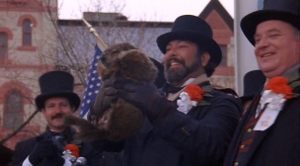
This is a time-honored trick and its practitioners are the judo masters of modern fiction. I never would’ve called Harold Ramis one of them until I saw Groundhog Day. Don’t get me wrong – I have nothing but respect for anyone and everyone who came out of SCTV. Ramis and his classmates kept American comedy from dying in the late twentieth century. Improv comedy as a genre certainly wouldn’t be what it is today without their hours of hard work in front of bad Chicago crowds, refining techniques we don’t even notice, they’ve become so common. Hell, they’re even taught in high schools. When total strangers indoctrinate children with your stuff, you know you’ve influenced popular culture. Same’s true when strangers use your movie’s title to describe grandscale deja vu. But what in (let’s say) Stripes or Back to School could possibly suggest Ramis had this much nuanced insight into our modern condition? Nothing, that’s what. Just goes to show you never know.
As if you needed me to tell you, Groundhog Day is the story of Phil Conners (Bill Murray), a Pittsburgh, Pennsylvania, weatherman (and possible relative of Curt Conners, the famous geneticist) perpetually disgusted with the daily grind of everyday life. As soon as he’s off-camera, he makes sure to mention the Big Network that might be snatching him up, away from the numbing boredom of routine in a mid-sized media market no one cares about. Every year, routine requires Phil make a February 2nd pilgrimage to Punxsutawney, PA, a town that’s asked groundhogs for weather advice since 1886. Every year, Phil does the same stand-up report in front of the same, unselfconsciously silly town festival. Every year Phil gets a little older and escaping this local weatherman shtick gets a little less likely. This year, Phil plans to get in, get out, and get back to what he considers his real life. Never mind what his eternally optimistic producer, Rita (Andie MacDowell) or doormat cameraman Larry (Chris Elliott) think – Phil’s “the talent” and thinks he needs to be kept “happy.” So the gods of dramatic irony trap him in a town he hates, on (from Phil’s perspective) the worst possible day, and force him to relive February 2nd over and over and over…
The movie – very wisely – chose not to speculate about the nature of Phil’s trap, or what malevolent force could possibly have the juice to spring it on him. For one thing, that’s not the point. For another, no answer could possibly satisfy. Not that I wouldn’t love to meet the mad gods behind this…except I know their names are Harold Ramis and Danny Rubin, the writers of Animal House and SFW, respectively. Any other answer would be an exercise in fan speculation…and I’ll save those for the end of this review. Or some too-loud conversation in a bar somewhere, after a comic book convention.
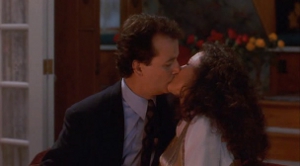
I’m sure Murray put as much into his own dialogue as he put into his physical performance: he was working through a divorce at the time, and that ambient level of emotional turmoil almost always makes for good cinema. Look at Temple of Doom. Plug your ears, but still: look at the damn thing and appreciate it for the massive achievement it is. Then come back and tell me how much you love the “sanctity of marriage.” Licentiousness all the way, baby! Broken people make better artists because they’re motivated to improve themselves, leading to improvements in their art…usually through osmosis. Or because they suck at improving themselves.
There are plenty of suggestions for where this story came from. After its box office success a phalanx of struggling sci-fi writers emerged with claims of plagiarism. Danny Rubin, no fool, referred all comers to an 1892 short story called “Christmas Every Day” by the safely-dead William Dean Howells. The two share some story DNA, but I don’t think breeding them would produce anything too terribly mutated. Besides, Murray already did the whole Modern Christmas Carol thing, making it easy to see Phil (at least in the beginning) as Frank Cross v. 2.22: He Who Can (Not) Advance.
But of all Groundhog Day‘s potential literary ancestors, my favorite is this bit from Friedrich Nietzsche‘s The Gay Science
#341 – The Greatest Weight – What if some day or night a demon were to steal after you into your loneliest loneliness and say to you: “This life as you now live it and have lived it, you will have to live once more and innumerable times more; and there will be nothing new in it, but every pain and every joy and every thought and sigh and everything unutterably small or great in your life will have to return to you, all in the same succession and sequence—even this spider and this moonlight between the trees, and even this moment and I myself. The eternal hourglass of existence is turned upside down again and again, and you with it, speck of dust!”
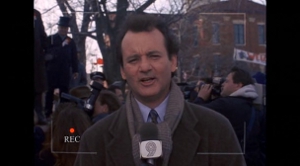
He was talking about the Eternal Return, one of many bad things Nietzsche hoped the Übermensch would rise to face. Phil, at least at the start, is the least-likely candidate for Over-manhood on the planet: bitter and cynical, Nietzsche would’ve called him “decadent,” the all-purpose insult of Nietzsche’s time, comparable to our modern “hipster.” Phil’s snobbish, stuck-up, inattentive of other people. Neitzsche would’ve seen far too much of himself in this performance. He and Phil would’ve automatically hated each other. When a stereotypical insurance salesman named Ned (Stephen Tobolowsky) accosts Phil on the street (over and over and over…) Phil’s incapable of remembering him. He doesn’t see people as anything other than mild annoyances, no matter if he’s worked with them for years (like Larry the Camera Guy) or told them to stop dating his sister back in high school (like Ned). That’s why he’s trapped in the loop, and through learning to see people as people Phil finally glimpses a way out.
But is being a dick cause enough to get trapped in Purgatory? Apparently so, because we never see Phil do anything truly awful until he’s well aware of his predicament…even starting to enjoy it. Ramis has specifically stated how he wanted to avoid exploring the darker side a no-consequence time loop, like murder, or mass arson. How many loops would it take before you burned Punxsutawney right to the ground, if only out of sheer desperation? How many times could you wake to the stirring notes of “I Got You, Babe” on the clock radio before pulling a ‘Salem’s Lot started to look good?
It only takes Phil three go-rounds to become a complete hedonist. This is after the medical resources of Punxsutawney (including a director’s cameo) fail him and he winds up drinking in the bowling alley with two locals, Ralph (Rick Overton) and Gus (Rick Ducommun). Phil asks them, “What would you do if you were stuck in one place and every day was exactly the same and nothing that you did mattered?” Ralph, in a perfect summation of everyday life for vast swaths of humanity, says,
“That about sums it up for me.”
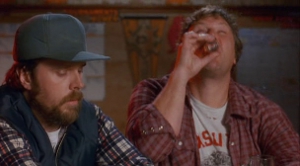
Of course, the Voice of Small Town American also informs him of his predicament’s upside. It “would mean there’d be consequences, no hangovers, we could do whatever we wanted!” So Phil starts eating sweets like a human-fly hybrid, punches Ned out, starts robbing armored trucks and date raping to his heart’s content. …basically doing all the things any reasonable person’s should rightly fear an Übermensch might do if he ever became self-aware. Phil only slips into existential despair after Rita repeatedly shuts down his attempts to get in her pants with some righteous bitch slapping. And the words, “I could never love someone like you Phil, because you’ll never love anyone but yourself.”
Phil insists, “I don’t even like myself” and I think that’s the first true statement he’s made in the whole movie (about an hour in). Before he can break the cycle, he has to stop trying to be the person someone else can love and start becoming a person he can live with. He becomes someone very close to Rita’s ideal man and that is mighty convenient…but it’s a choice of narrative focus I understand. This is a comedy, and love stories frequently prop up comedic plots because they can be done simply and cheaply.
Thank the groundhog that’s not the case here. And thank Andie MacDowell and her incredibly cute South Carolina accent. Her easy charm makes it easy for us to fall in love with Rita, which it turn makes it easier for us to believe Phil might, too…after a few thousand go-rounds. Nietzsche felt a true Übermensch would be so well-adjusted he’d gladly face the Eternal Return for the sake of One Good Day. Hell, not even that – in my copy of Gay Science the line reads “a tremendous moment.” Rita’s here to provide that for Phil, but MacDowell provides something else for us, the audience: a baseline for comparison. Rita, being the new producer about Pittsburg, still possesses all the things Phil seems to have forgotten about: hobbies, interests, a past we explore (through Phil’s prompting) and dreams of life beyond achieving higher professional status. The two make this a true double-header by being so complementary. More than the Obligatory Love Interest, Rita is what Phil is not: well-adjusted.
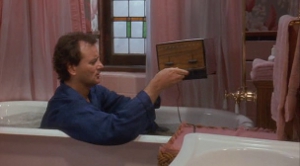
Phil doesn’t even start to adjust to his situation until after confessing it to Rita three times. (And it would be three times, wouldn’t it?) Twice she rejects him, calling him crazy. Wouldn’t you? But on the third time (after he’s learned enough about Punxsutawney to rattle off the biographies of all its residents) she accepts him and joins him as an “observer.” They wind up having a totally platonic sleep together, and the “next” day, Phil turns from crime, despair, and suicide toward knowledge, hope, and self-improvement. By the end, he’s a piano playing, ice-sculpting expert on French poetry, as close to an Übermensch as any Bill Murray character I’ve ever seen. He certainly makes the title “Renaissance man” look woefully inadequate.
Nietzsche would probably hate this movie. Might enjoy the first hour and change, up through Phil’s repeated suicide attempts and declaration of his own divinity (labeling himself a god, not the God, a distinction Nietzsche would’ve appreciated)…but those last twenty minutes would’ve sunk it. Nietzsche hated love, and hated women insofar as they were part of the human race, which he despised on general principals. If we’re talking about modern movies featuring ageless protagonists, I get the sense Nietzsche would be a Highlander fan. At the very least, he’d enjoy all the suffering we’ve endured (piteous masses that we are) at the Highlander franchise’s hands.
Groundhog Day is Highlander without the sword fights, a rare case when the absence of sword fighting actually makes things better. You could draw an even better (if anachronistic) comparison to Fight Club, especially if you’re me and Fight Club comparisons come unbidden from the Tyler Durden-y part of your mind, whether you want them to or not. Phil is the 1993 model of Fight Club‘s unreliable and unnamed narrator: a disassociated, down-in-the-dumps yuppie who must reconstruct himself into a better man before he can escape a self-imposed(?) cycle of craziness. Maybe Phil didn’t have to courage to “just go with it,” as Tyler says, and so stuck himself in time. Maybe Phil’s responsible for all this, only allowing himself a reprieve after he’s become fascinating, open-hearted and just plain good enough for Rita to spend the night with of her own volition.
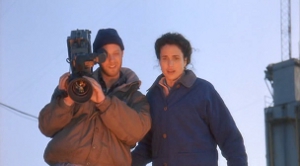
Hey, it’s an explanation. Really, the time loop just is because no other concept could provide Bill Murray so many set-ups (as the rest of his romp-ish, ’90s comedies prove – to me, at least). For a movie marketed as a comedy, it handles wild tone shifts with a deft hand, rising from the heights of manic absurdism to the quiet desperation of a man electrocuting himself with a toaster. The very idea of killing yourself over and over, only to wake up the “next” day unharmed, is pretty damn absurd on its face. Other movies would bend over backward to make that jibe in with, say, so much small town Americana.
Groundhog Day thrives on this juxtaposition. The film is alive in ways other comedies are not. It manages to explore the entire spectrum of human experience, from crippling depression to transcendental hope, and still be a comedy suitable for all ages, so long as your IQ is higher than your age by at least one digit. I recommend everyone watch it as often as possible. It won’t replicate Phil’s experience…but it might just allow you to appreciate how even the strangest, sillies comedies can also be inspirations. Movies that change lives by showing us how and why we can all change, and become, if not better people, than better versions of ourselves.
![]()
![]()
![]()
![]()
![]()

I just wanted to say that this happens to be my favourite comedy of all time (so far). Normally I can’t watch a comedy over and over again because it eventually makes the jokes stale but just like the time loop that Phil is stuck in I can watch it over and over again (the other exception is MP’s Holy Grail).
And props to you good sir for bringing up a perspective that had never occurred to me in all those viewings (Nietzchean philosophy). Prometheus could learn a lot from this movie on that front…actually Prometheus needs to learn about basic plotting, characterization and science first, but I digress.
Comedy is, without a doubt, my least re-watched genre, and for exactly the same reason. I’ll rewatch the two good Aliens or the two good Terminator movies every year – even seek out excuses to watch them multiple times within a twelve month span. But I can and have gone half a decade before I rewatch a comedy, even one of my favorites. Especially one of my favorites. We all know what familiarity breeds, don’t we?
Yes – watched it again today (2/2/2013). Yes – you’ve nailed it. and of course we all could use a dose of this film’s perspective Over and over again. Great review – thanks
You’re welcome, as usual.
Groundhog Day always reminded me less of a Harold Ramis comedy and more of a Coen brothers film. There’s comedy in it, but I wouldn’t call it a ‘comedy’, it’s just a good friggen film.
It defiantly occupies the borderland between Comedy and Drama, where the lines grown indistinct. There was a lot of genre mixing going around in the 90s anyway, but I think Ramis attached himself to this specifically as a counter to his “zany antics” period…characterized by your Caddyshack 2s and your Club Paradises. You look at those, and they’re straight-up Comedic Romps. In that company, Ghostbusters starts to look more like the odd man out, with its potent mix of horror movie grammar and understated (is it a pun if I call them “deadpan”?) jokes. “That’s a big Twinkie,” etc.